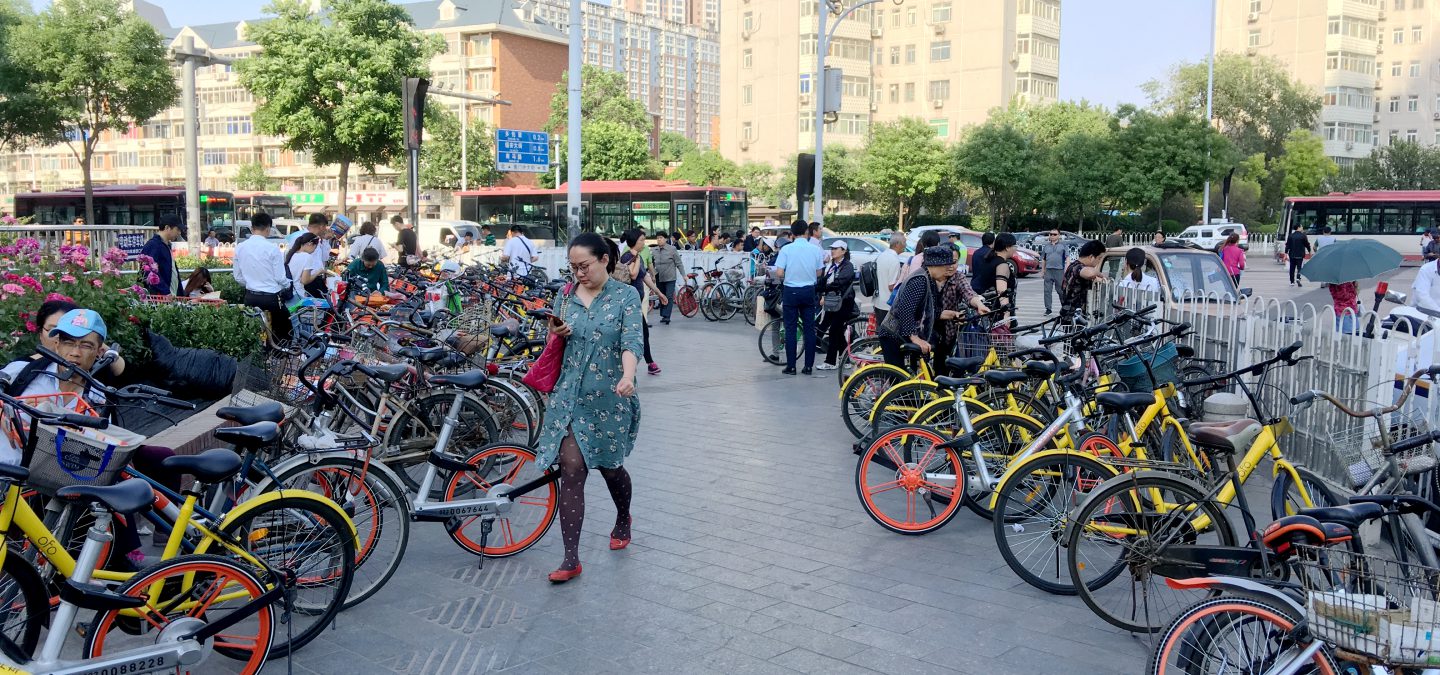
Keep up with our latest news and projects!

In recent years a new mode of transportation has emerged in China: dockless bikeshare.
Compared to traditional bikeshare systems with fixed stations and parking docks, this dockless model allows a rider to lock and unlock a GPS-enabled bike anywhere by smartphones. As an effective way to promote ‘Green Travel’ and solve the “Last Mile” problem, dockless bikeshare gains popularity quickly in China and even all around the world.
The current dockless bikeshare system was born as a Peking University school project called Ofo in 2014. Later, Mobike first introduced the dockless bikeshare into urban cities. With the development of sharing economy, high-speed mobile networks, and smartphone technology, dockless bikeshare began to step into major cities in China in 2016 and got rapid expansion in 2017.
As of February 2018, there were more than 77 dockless bikeshare companies in China operating approximately 23 million bikes and serving 400 million registered users. The cumulative number of services has exceeded 17 billion. The new bikeshare mode had become so popular with its vast amount, coverage, and convenience for the short distance commuters. In the meantime, it saves 16.1 billion RMB of the congestion cost and bringing 221.3 billion RMB of economic and social benefit to the whole society in one year. Dockless bikeshare has brought significant changes to China and even become one of China’s “New Four Major Inventions” as hailed by the Chinese media.
Dockless bikeshare enables more people to bike in the city. A white paper published by Mobike earlier shows total bike ridership – not just shared bikes – has increased significantly. In Guangzhou, ITDP(an international NGO) conducted a tracking survey of bike volume along the Guangzhou Zhongshan Avenue BRT corridor, and found that after the bikeshare stationed in Guangzhou (06/2017), the bike volume from the road section is 100% higher than that in previous years.
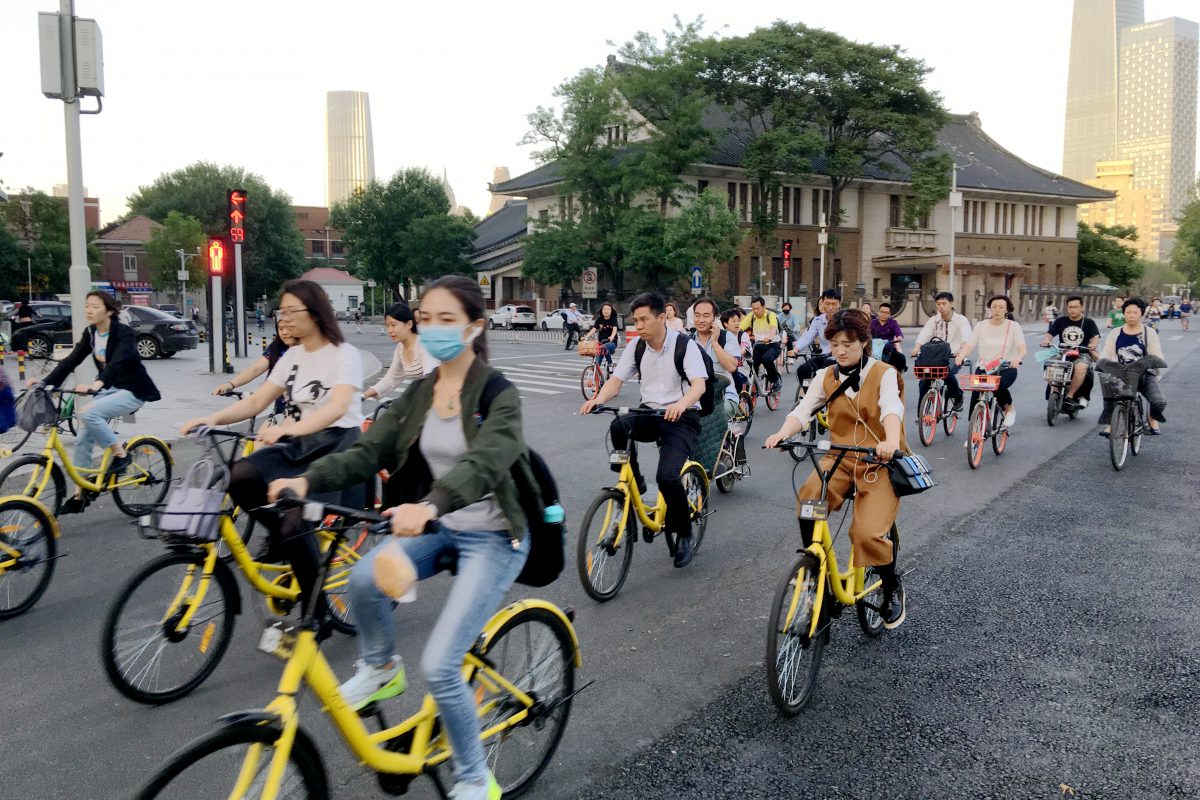 Dockless bikeshare in Tianjin, China
Dockless bikeshare in Tianjin, China
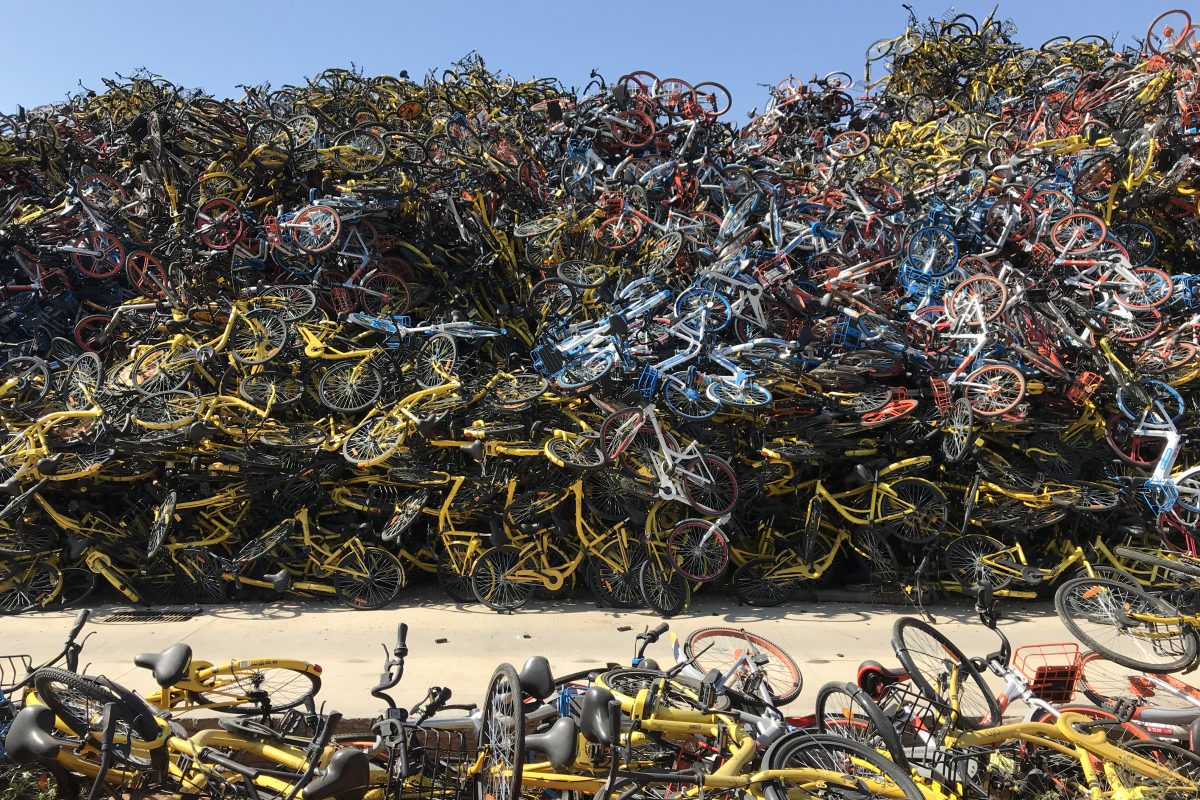 Dockless bikeshare graveyards in Xiamen, China.
Dockless bikeshare graveyards in Xiamen, China.
This bicycle renaissance caused by bikeshare helps cities to reduce auto emissions, ease air pollution and climate change by cutting vehicle journeys. In 2017, Mobike was awarded “Champions of the Earth” by UN Environment for creating 18.2 billion kilometres of rides in 200 cities, avoiding 4.4 million tonnes of carbon dioxide emissions, equivalent to taking 1.24 million cars off the road for a year.
In the meantime, the bicycle renaissance saves 16.1 billion RMB of the congestion cost and bring 221.3 billion RMB of economic and social benefit to the whole society in one year. Dockless bikeshare has brought significant changes to China and even become one of China’s “New Four Major Inventions” as hailed by the Chinese media.
Biking infrastructure also leads to the improvement of the urban ecological environment. Guangzhou built 3000 kilometers of greenways especially for walking and biking, which has increased a large area of urban green space. The oxygen production of the greenway has reached 440000 tons, and the average concentration of air negative ions in urban green space is 440000/cm3, which is of great significance for improving air quality and alleviating urban diseases in Guangzhou.
A huge number of shared bikes poured into the city to provide short-distance public services, which not only brought great convenience to urban travel, but also yielded negative consequences such as blocked sidewalks and vandalism of the bikes. Due to the disorderly expansion of the market, oversupply has led to graveyards of bikes in more than 20 cities and raised deep concerns about quality control, maintenance, and management of these systems.
Also, the financial supervision of dockless bikeshare companies raises public concerns. Until now, the profit model of dockless bikeshare is still unclear, most companies chose to expand their scale by misappropriating the invested capital and users’ deposits, aiming to gain new customers and higher market shares. After two years’ operation, most companies are still unprofitable, and more than 22 companies were forced to go bankrupt, including Bluegogo, the third-largest DBS company in China. Also, hundreds of millions of dollars of customer bike deposits cannot be refunded. Until August 2018, Ofo was under pressure to refund a deposit of more than 241 million dollars to 14.69 million users.
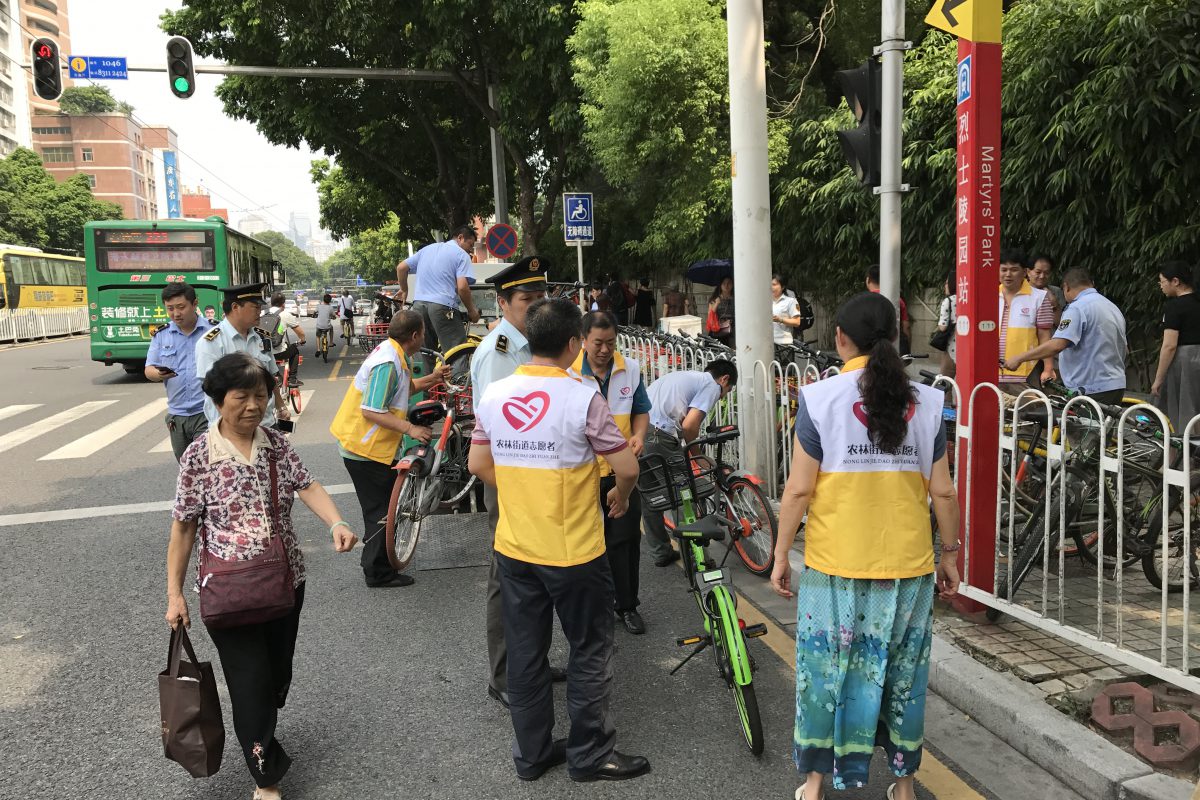 Co-management of dockless bikeshare in Guangzhou.
Co-management of dockless bikeshare in Guangzhou.
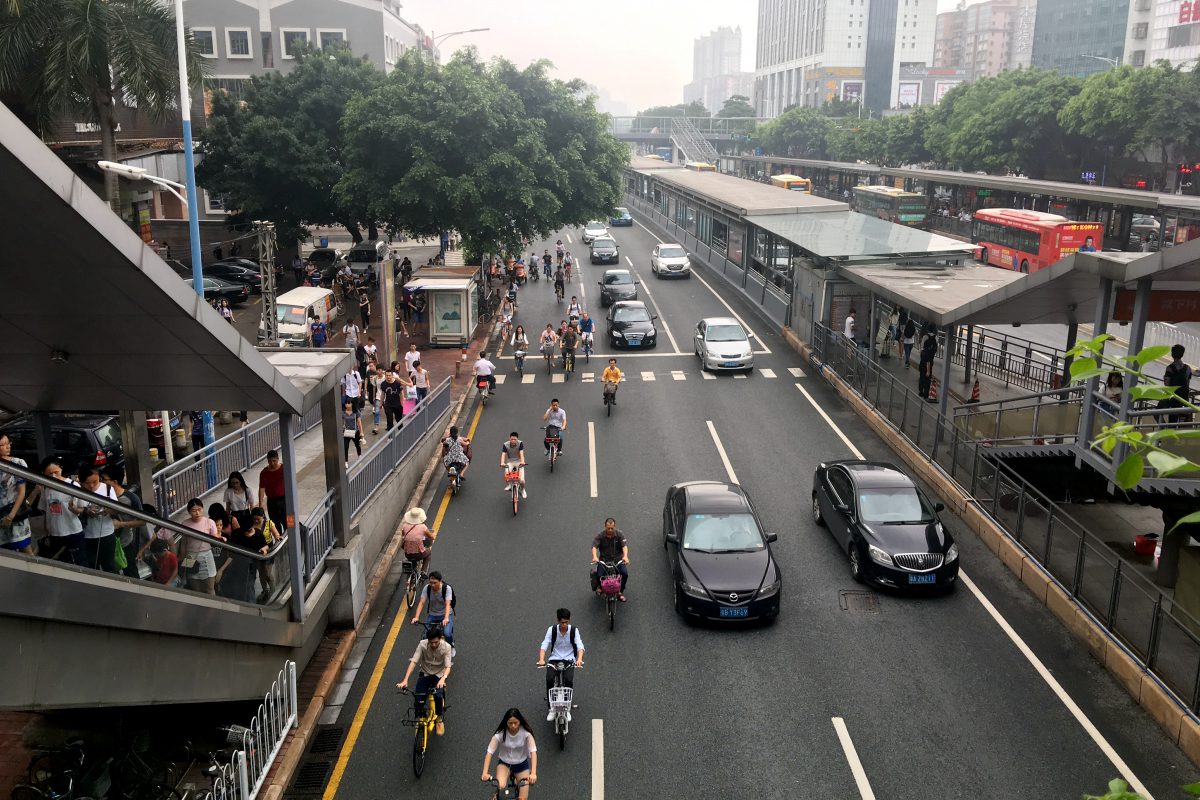 Bike volume of Guangzhou Zhongshan Avenue had
increased by 100% after DBS launch.1
Bike volume of Guangzhou Zhongshan Avenue had
increased by 100% after DBS launch.1
Facing the whole new challenges that never encountered before, the Chinese government tried to explore a new way for sustainable development of dockless bikeshare. Since 2016, the national government and cities started implementing policies to guide and regulate dockless bikeshare systems. To deal with oversupply, more than 25 cities had announced a moratorium on launching new shared bikes. Beijing cut down the number of shared bikes in the city from 2.35 million to 1.91 million. Guangzhou and Xiamen introduced an evaluation competition mechanism, which included the operation, maintenance, capital protection, and other indicators, to determine the dockless bikeshare companies’ operating license and numbers of bikes in the next period. In early 2019, the national government began to formulate policies about financial supervision to refine the management of user deposits further. Most dockless bikeshare services are now deposit-free or binding to the social credit system.
Also, cities pay more attention to the biking environment and step up efforts to improve bicycle infrastructure to meet the surging demand for biking. Shenzhen plans to build 100km bike lanes, 8000 bike parking zones, and even bicycle superhighways in the future. Meanwhile, the dockless bikeshare companies are trying to explore new ways like technological innovation, integrating into life service platform, or promoting new shared e-bike and e-scooter for sustainable development.
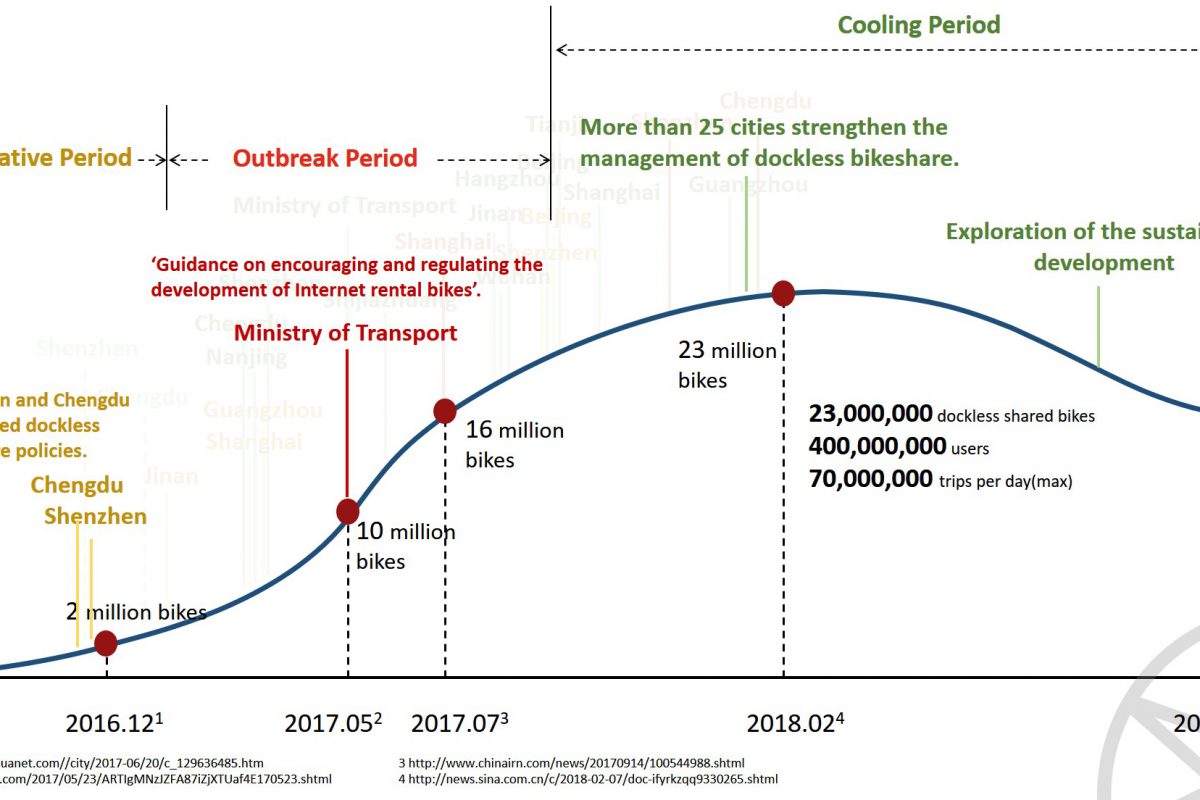
Dockless bikeshare, as one of China’s “new four great inventions”, has led a round of green travel craze and brought convenience to public travel in the world. However, it has also brought obvious negative impacts on the urban environment. The management of dockless bikeshare involves many aspects, such as public space order management, uncivilized behavior management of cyclists, daily maintenance of bikes, bike lane planning, parking space setting, investment and evacuation, capital supervision, and so on.
Therefore, the city should actively explore the co-governance and co-management of the government, companies, and the public, promote the delicacy management of the industry, and protect the healthy and orderly development of dockless bikeshare:
Dockless bikeshare can be a key component in achieving access, economic development, sustainability, health, and other efforts cities are already undertaking. The city should welcome and actively guide the development of dockless bikeshare.
The city should set a series of policies and guidelines like management measures, operation service specification, shared bike’s technical standard, and riding&parking guideline for the government, companies, and users.
The city should standardize the management of bike quality, launching, parking, fund, data sharing, operation evaluation, and emergency plan of the dockless bikeshare industry with the supervision of the public.
The city should promote civilized cycling and orderly parking guidance by media and the internet to improve users’ behavior.
The city should improve bike lanes, bike parking zones, human-oriented streets, and promote Car-free Day for better cycling.
-welcome and actively guide the development of dockless bikeshare
-co-governance and co-management of the government, dockless bikeshare companies, and the public
-‘wait and see’ policies
-manage dockless bikeshare only by transportation department or the police